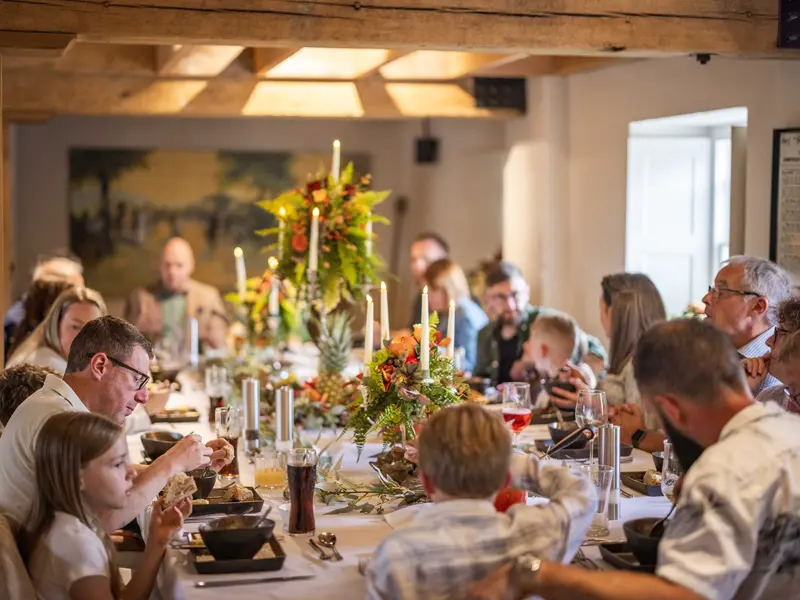Emma’s story is one that mirrors the Black Pool Mill journey...
Meet the miller supplying Black Pool Mill
There are just a few working water-powered corn mills left in Wales. Fittingly for Black Pool Mill – itself a former flour mill, first built in 1813 – one of those working mills supplies the restaurant with traditional stoneground flour. Y Felin (Welsh for ‘The Mill’) is a mill in St Dogmaels, west Wales headed up by Emma Williams the miller, who took over from her father in 2018.
Emma’s story is one that mirrors the Black Pool Mill journey – a passion and determination to keep alive a part of Wales’ industrial heritage. For Emma, a former nurse in North Wales, it meant returning to Y Felin and learning the milling process from her father, Mike Hall. “It was just a case of watch and learn,” she said.

“It’s hard work physically – far harder than I ever thought it would be. Everything is heavy, everything has to be lifted and moved, everything is dusty. We have to clean all the time just to keep the dust out and reduce the fire risk.”
Emma’s father died in 2021 but his life’s work lives on. “It’s made me so proud of what he achieved,” she said. The former aircraft engineer was serving in Iran when he and his young family were evacuated as the 1978 revolution gained momentum.
Mike and his wife Jane came to St Dogmaels and bought the old mill house and snapped up the dilapidated mill at the same time to protect against the possibility of future neighbours: “There was so much to do but it didn’t seem to faze him at all,” Emma said. Y Felin has had several owners from the 1640s and the black wooden door is the 600-year-old original. Emma points out the symbol of two inverted Vs carved into the wood – ‘witch marks’ believed to have turned away evil, providing protection to the building and those who lived or worked within it during the Reformation.
Throughout 1979, Emma’s dad set upon digging out the old mill pond and the wheel pit. By 1981, the mill was up and running. A “canny” man ahead of his time, her dad recognised that few people were aware of the benefits of stoneground flour and so he set up a tearoom with Jane baking using their own flour. Emma spent her childhood working in the tearoom alongside her mother and her driving lessons doubled up as delivering 32kg bags of flour to bakeries. In those days, each bakery would take 8-12 sacks of flour every week. “They are all closed now,” said Emma. She uses the same farmers that her dad did in his day.
Her own nursing background goes hand in hand with her interest in the health properties of stone ground flour. She lists reduced cardiovascular disease risk, type II diabetes, and bowel complaints as some benefits. One of the grains - Hen Gymro, which translates to Old Welshman – is part of Wales’ heritage which fell out of favour as commercial grains took over. But it’s having a renaissance thanks to the National Plant Phenomics Centre (IBERS) at Aberystwyth University, which has been growing trial plots of Hen Gymro since 2019. Milled traditionally, the grain produces lovely soft flour which bakes a dark, rich loaf.
Yet using British grain requires talent and patience, in part thanks to the higher protein levels it contains. Emma describes how it’s a fine balance between controlling the flow of water over the mill wheel and the supply of grain to the stones. Her skills and knowledge are a dying breed – the millwrights who come to sharpen her stones are on the Heritage Crafts Association Red List of Endangered Skills. But their efforts are richly rewarded. “The taste is remarkably better,” she said about the final loaves baked by her baker, Gabriele. “It’s so much tastier that if you have bread made with stone ground flour and compare it with roller flour, the flavour just isn’t there.”
For all the efficiencies that electricity and industrialisation bought, something much deeper was lost. Few people know the satisfaction that comes with opening up the sluice gate to allow water to pour onto a wheel and hear the almost-gutteral rumbling as the cogs stir into action. The smell of the freshly ground flour penetrates everything and a layer of flour dust settles on every surface. It’s a feeling Emma knows well, her love for her trade evident in her smile.

And it’s a feeling the chefs at Black Pool Mill take great care to do justice, surrounded by the old workings of our own mill. Taking Emma’s stoneground flour, head chef Paul Owen and his team make their own bread to accompany some of the dishes on the menu. Changing to reflect the seasons and make the most of local produce, the menu celebrates some of the finest offerings from Pembrokeshire and Wales. Paul said: “Stoneground flour from Y Felin brings a complex flavour to our bread with a mild sourness and a deep, rich almost nutty taste. We like to let the flavour do the talking and it’s particularly good spread with butter.” Paul gives the same respect to all the ingredients in the Black Pool Mill kitchen and his aim is to delight guests with classic cooking and delicious flavours.




